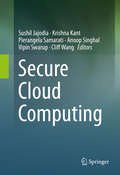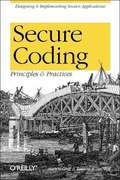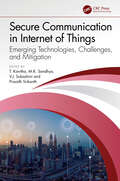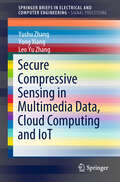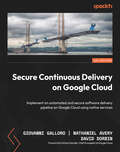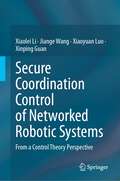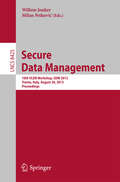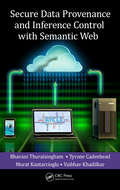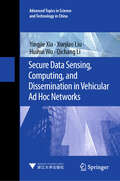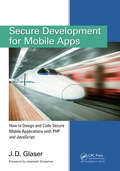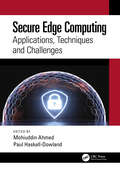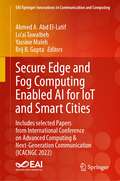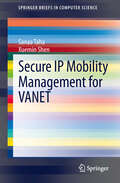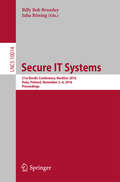- Table View
- List View
Secrets of a Cyber Security Architect
by Brook S. SchoenfieldAny organization with valuable data has been or will be attacked, probably successfully, at some point and with some damage. And, don't all digitally connected organizations have at least some data that can be considered "valuable"? Cyber security is a big, messy, multivariate, multidimensional arena. A reasonable "defense-in-depth" requires many technologies; smart, highly skilled people; and deep and broad analysis, all of which must come together into some sort of functioning whole, which is often termed a security architecture. Secrets of a Cyber Security Architect is about security architecture in practice. Expert security architects have dozens of tricks of their trade in their kips. In this book, author Brook S. E. Schoenfield shares his tips and tricks, as well as myriad tried and true bits of wisdom that his colleagues have shared with him. Creating and implementing a cyber security architecture can be hard, complex, and certainly frustrating work. This book is written to ease this pain and show how to express security requirements in ways that make the requirements more palatable and, thus, get them accomplished. It also explains how to surmount individual, team, and organizational resistance. The book covers: What security architecture is and the areas of expertise a security architect needs in practice The relationship between attack methods and the art of building cyber defenses Why to use attacks and how to derive a set of mitigations and defenses Approaches, tricks, and manipulations proven successful for practicing security architecture Starting, maturing, and running effective security architecture programs Secrets of the trade for the practicing security architecture Tricks to surmount typical problems Filled with practical insight, Secrets of a Cyber Security Architect is the desk reference every security architect needs to thwart the constant threats and dangers confronting every digitally connected organization.
Secrets of the Animator
by Julia PeguetBased on the author's own notes compiled over 18 years, this work is intended for both animation students and professionals. This manual is a learning tool focusing exclusively on the work of animators. It provides all the keys to understanding the principles of motion and how to transfer them to characters, whether drawn or modeled, 2D or 3D, or human or animal. Julia Peguet explains the principles of physics applicable to any motion (animation curve, momentum, rebound, etc.) and provides practical tips for stabilizing a puppet, animating a character's mouth and eyes, or even making a character stand out with a particular gait. Sketches and photographs illustrate technical recommendations step by step. Exercises and boxes containing tips and notes are also provided.
Secrets of the JavaScript Ninja
by Josip MarasSummaryMore than ever, the web is a universal platform for all types of applications, and JavaScript is the language of the web. If you're serious about web development, it's not enough to be a decent JavaScript coder. You need to be ninja-stealthy, efficient, and ready for anything. This book shows you how.Purchase of the print book includes a free eBook in PDF, Kindle, and ePub formats from Manning Publications.About the TechnologyJavaScript is rapidly becoming a universal language for every type of application, whether on the web, on the desktop, in the cloud, or on mobile devices. When you become a JavaScript pro, you have a powerful skill set that’s usable across all these domains.About the BookSecrets of the JavaScript Ninja, Second Edition uses practical examples to clearly illustrate each core concept and technique. This completely revised edition shows you how to master key JavaScript concepts such as functions, closures, objects, prototypes, and promises. It covers APIs such as the DOM, events, and timers. You’ll discover best practice techniques such as testing, and cross-browser development, all taught from the perspective of skilled JavaScript practitioners.What’s InsideWriting more effective code with functions, objects, and closuresLearning to avoid JavaScript application pitfallsUsing regular expressions to write succinct text-processing codeManaging asynchronous code with promisesFully revised to cover concepts from ES6 and ES7About the ReaderYou don’t have to be a ninja to read this book—just be willing to become one. Are you ready?About the AuthorsJohn Resig is an acknowledged JavaScript authority and the creator of the jQuery library. Bear Bibeault is a web developer and author of the first edition, as well as coauthor of Ajax in Practice, Prototype and Scriptaculous in Action, and jQuery in Action from Manning. Josip Maras is a post-doctoral researcher and teacher.Table of ContentsPART 1 - WARMING UPJavaScript is everywhereBuilding the page at runtimePART 2 - UNDERSTANDING FUNCTIONSFirst-class functions for the novice: definitions and arguments Functions for the journeyman: understanding function invocation Functions for the master: closures and scopesFunctions for the future: generators and promisesPART 3 - DIGGING INTO OBJECTS AND FORTIFYING YOUR CODEObject orientation with prototypesControlling access to objectsDealing with collectionsWrangling regular expressionsCode modularization techniquesPART 4 - BROWSER RECONNAISSANCEWorking the DOMSurviving eventsDeveloping cross-browser strategies
Secrets to Free Advertising on the Internet: A Complete Comprehensive Guide For Large and Small Businesses on How to Take Advantage of All the Advertising Media Available on the Internet
by Robert Noll Anne BrashierWritten for: Accountants, Doctors, Lawyers, Realtors, Insurance Brokers, Artists, all MLM Reps, Retail Stores...Any type of small to medium-size business interested in FREE ways to advertise on the internet. Email Marketing - Spam or a viable means of advertising? Classifieds - Quick ways to list your company or business for FREE. Search - Google, Yahoo, Bing and More...Easy Placement and all for FREE. Blogs - Should you or shouldn’t you??An effective way to advertise for FREE? MySpace - Set your company on auto-pilot for more sales, and it’s FREE! Facebook - Put a FREE face on your business and gain hundreds of new customers. Pay-Per-Click - Okay, it’s not FREE, but can be quick and cost-effective! Secrets to Free Advertising on the Internet will help your business grow, whether you are already net-savvy or new to the World Wide Web. Marketing expert Robert Noll gives you helpful hints and clear, easy tips on how to use the wide variety of FREE advertising media available online. Reaching out to a whole new customer base can seem intimidating, but Secrets to Free Advertising on the Internet helps you focus your strategy so you don't feel overwhelmed. No matter what your company does, a strong online advertising campaign can help you do it better.
Secure Automatic Dependent Surveillance-Broadcast Systems (Wireless Networks)
by Xuemin Sherman Shen Hongwei Li Haomiao YangThis book proposes secure schemes to address security challenges in secure automatic dependent surveillance-broadcast systems (ADS-B) from five different angles. First, the authors examine encryption schemes applied to the ADS-B environment for protecting messages confidentiality. Second, they propose an ADS-B broadcast authentication scheme with batch verification by employing an identity-based signature. Third, they present ADS-B broadcast authentication scheme based on a digital signature with message recovery, which provides a feature that the message is recoverable from the signature. Fourth, they propose a new cryptographic solution to ADS-B security. Finally, they propose an accurate and efficient cognitive aircraft location verification scheme preserving aircraft location privacy by utilizing a grid-based k-nearest neighbor algorithm. In summary, the authors show how ADS-B data links can greatly enhance flight safety by these proposed schemes without sacrificing data security.Proposes several secure schemes to address security challenges in secure automatic dependent surveillance-broadcast systems (ADS-B);Provides extensive experiments and evaluates the proposed schemes using real-world data;Shows how ADS-B data links can greatly enhance safety without sacrificing data security
Secure Cloud Computing
by Sushil Jajodia Cliff Wang Vipin Swarup Krishna Kant Pierangela Samarati Anoop SinghalThis book presents a range of cloud computing security challenges and promising solution paths. The first two chapters focus on practical considerations of cloud computing. In Chapter 1, Chandramouli, Iorga, and Chokani describe the evolution of cloud computing and the current state of practice, followed by the challenges of cryptographic key management in the cloud. In Chapter 2, Chen and Sion present a dollar cost model of cloud computing and explore the economic viability of cloud computing with and without security mechanisms involving cryptographic mechanisms. The next two chapters address security issues of the cloud infrastructure. In Chapter 3, Szefer and Lee describe a hardware-enhanced security architecture that protects the confidentiality and integrity of a virtual machine's memory from an untrusted or malicious hypervisor. In Chapter 4, Tsugawa et al. discuss the security issues introduced when Software-Defined Networking (SDN) is deployed within and across clouds. Chapters 5-9 focus on the protection of data stored in the cloud. In Chapter 5, Wang et al. present two storage isolation schemes that enable cloud users with high security requirements to verify that their disk storage is isolated from some or all other users, without any cooperation from cloud service providers. In Chapter 6, De Capitani di Vimercati, Foresti, and Samarati describe emerging approaches for protecting data stored externally and for enforcing fine-grained and selective accesses on them, and illustrate how the combination of these approaches can introduce new privacy risks. In Chapter 7, Le, Kant, and Jajodia explore data access challenges in collaborative enterprise computing environments where multiple parties formulate their own authorization rules, and discuss the problems of rule consistency, enforcement, and dynamic updates. In Chapter 8, Smith et al. address key challenges to the practical realization of a system that supports query execution over remote encrypted data without exposing decryption keys or plaintext at the server. In Chapter 9, Sun et al. provide an overview of secure search techniques over encrypted data, and then elaborate on a scheme that can achieve privacy-preserving multi-keyword text search. The next three chapters focus on the secure deployment of computations to the cloud. In Chapter 10, Oktay el al. present a risk-based approach for workload partitioning in hybrid clouds that selectively outsources data and computation based on their level of sensitivity. The chapter also describes a vulnerability assessment framework for cloud computing environments. In Chapter 11, Albanese et al. present a solution for deploying a mission in the cloud while minimizing the mission's exposure to known vulnerabilities, and a cost-effective approach to harden the computational resources selected to support the mission. In Chapter 12, Kontaxis et al. describe a system that generates computational decoys to introduce uncertainty and deceive adversaries as to which data and computation is legitimate. The last section of the book addresses issues related to security monitoring and system resilience. In Chapter 13, Zhou presents a secure, provenance-based capability that captures dependencies between system states, tracks state changes over time, and that answers attribution questions about the existence, or change, of a system's state at a given time. In Chapter 14, Wu et al. present a monitoring capability for multicore architectures that runs monitoring threads concurrently with user or kernel code to constantly check for security violations. Finally, in Chapter 15, Hasan Cam describes how to manage the risk and resilience of cyber-physical systems by employing controllability and observability techniques for linear and non-linear systems.
Secure Coding: Principles & Practices
by Mark G. Graff Kenneth R. Van WykDespite their myriad manifestations and different targets, nearly all attacks on computer systems have one fundamental cause: the code used to run far too many systems today is not secure. Flaws in its design, implementation, testing, and operations allow attackers all-too-easy access. Secure Coding: Principles & Practices looks at the problem of bad code in a new way. This concise and highly readable book is packed with advice based on the authors' decades of experience in the computer security field.
Secure Communication for 5G and IoT Networks (EAI/Springer Innovations in Communication and Computing)
by S. Velliangiri P. Karthikeyan M. GunasekaranThis book highlights research on secure communication of 5G and the Internet of Things (IoT) Networks, along with related areas to ensure secure and Internet-compatible IoT systems. The authors not only discuss 5G and IoT security and privacy challenges, but also energy efficient approaches to improving the ecosystems through communication. The book addresses the secure communication and privacy of the 5G and IoT technologies, while also revealing the impact of IoT technologies on several scenarios in smart city design. Intended as a comprehensive introduction, the book offers in-depth analysis and provides scientists, engineers and professionals the latest techniques, frameworks and strategies used in 5G and IoT technologies.
Secure Communication in Internet of Things: Emerging Technologies, Challenges, and Mitigation
by T. Kavitha Prasidh Srikanth M. K. Sandhya V. J. SubashiniThe book Secure Communication in Internet of Things: Emerging Technologies, Challenges, and Mitigation will be of value to the readers in understanding the key theories, standards, various protocols, and techniques for the security of Internet of Things hardware, software, and data, and explains how to design a secure Internet of Things system. It presents the regulations, global standards, and standardization activities with an emphasis on ethics, legal, and social considerations about Internet of Things security. Features:● Explores the new Internet of Things security challenges, threats, and future regulations to end-users.● Presents authentication, authorization, and anonymization techniques in the Internet of Things.● Illustrates security management through emerging technologies such as blockchain and artificial intelligence.● Highlights the theoretical and architectural aspects, foundations of security, and privacy of the Internet of Things framework.● Discusses artificial-intelligence-based security techniques, and cloud security for the Internet of Things.It will be a valuable resource for senior undergraduates, graduate students, and academic researchers in fields such as electrical engineering, electronics and communications engineering, computer engineering, and information technology.
Secure Compressive Sensing in Multimedia Data, Cloud Computing and IoT (SpringerBriefs in Electrical and Computer Engineering)
by Yong Xiang Yushu Zhang Leo Yu ZhangThis book gives a comprehensive and systematic review of secure compressive sensing (CS) for applications in various fields such as image processing, pattern recognition, Internet of things (IoT), and cloud computing. It will help readers grasp the knowledge of secure CS and its applications, and stimulate more readers to work on the research and development of secure CS. It discusses how CS becomes a cryptosystem, followed by the corresponding designs and analyses. The application of CS in multimedia data encryption is presented, in which the general design framework is given together with several particular frameworks including parallel CS, involvement of image processing techniques, and double protection mechanism. It also describes the applications of CS in cloud computing security and IoT security, i.e., privacy-preserving reconstruction in cloud computing and secure low-cost sampling in IoT, respectively.
Secure Connected Objects
by Dominique Paret Jean-Paul HuonIn this book, the authors focus on the concrete aspects of IoT (Internet of Things): the daily operation, on the ground, of this domain, including concrete and detailed discussion of the designs, applications and realizations of Secure Connected Things and IoT. As experts in the development of RFID and IoT technologies, the authors offer the reader a highly technical discussion of these topics, including the many approaches (technical, security, safety, ergonomic, economic, normative, regulations, etc.) involved in Secure Connected Objects projects. This book is written both for readers wishing to familiarize themselves with the complex issues surrounding networking objects and for those who design these connective “things”.
Secure Continuous Delivery on Google Cloud: Implement an automated and secure software delivery pipeline on Google Cloud using native services
by Giovanni Galloro Nathaniel Avery David DorbinBuild an end-to-end continuous delivery pipeline on Google Cloud and secure your software supply chain using GCP tools and services including Cloud Code, Cloud Workstations, Cloud Build, Artifact Registry, and Cloud DeployKey FeaturesGain hands-on experience building an end-to-end software delivery pipeline using Google Cloud servicesDeploy your applications on GKE, Cloud Run, and across hybrid and multi-cloud environmentsSecure pipelines with artifact scanning, dependency vulnerability checks, signed provenance, and admission controlPurchase of the print or Kindle book includes a free PDF eBookBook DescriptionContinuous delivery, a cornerstone of modern software engineering, facilitates quick and secure software delivery using a robust toolkit encompassing automated builds, testing, source code management, artifact storage, and deployment. Whether you integrate tools from different providers or use a set of managed services from a single cloud provider, the goal is to streamline setup, integration, and management. This book focuses on continuous delivery on Google Cloud. Starting with an introduction to continuous delivery and secure software supply chain concepts, this book uses hands-on exercises to demonstrate how to continuously test your application with Skaffold and Cloud Code, leverage AI-assisted code generation with Cloud Code and Cloud Workstations, and automate your continuous integration with Cloud Build. You’ll see how to store and scan your software artifacts on Artifact Registry, orchestrate deployments with Cloud Deploy, and release your software on GKE and Cloud Run, configured to admit only trusted code. Using an example application, you’ll implement tools for creating an end-to-end delivery pipeline using Google Cloud services. By the end of this book, you’ll be able to build a secure software delivery pipeline from development to production using Google Cloud managed services and best practices.What you will learnCreate an end-to-end continuous delivery pipeline using Cloud Build, Artifact Registry, and Cloud DeployDevelop, build, and deploy container-based applications with Skaffold and Cloud CodeExperiment with AI-assisted code generation in Cloud CodeAutomate continuous integration with Cloud Build triggersAutomate deployment on GKE and Cloud Run through Cloud DeployEnhance pipeline security with Artifact Analysis, Binary Authorization, and SLSAApply best practices, including logging and monitoringWho this book is forThis book is for DevOps, Platform, and Cloud Engineers tasked with managing application deployment and creating continuous delivery pipelines who want to automate workflows in a fully managed, scalable, and secure platform. Software developers involved in application delivery and interested in harnessing Google Cloud tools to optimize development flow status and feedback loop will also find this book useful. Prior knowledge of Google Cloud fundamentals (including Cloud APIs and IAM), software delivery, containerization, and Kubernetes will enhance the reading experience.
Secure Coordination Control of Networked Robotic Systems: From a Control Theory Perspective
by Xinping Guan Xiaolei Li Xiaoyuan Luo Jiange WangAs one of the core equipments and actuators, robotic technology has attracted much attention and has made great progress. However, a single robotic system is often unable to handle complex tasks due to limitations in sensors, microprocessors, actuators, and the ability to handle complex situations. With the development of distributed control and microprocessing technology, networked robotic systems have greatly expanded their perceptual, computational, and execution capabilities, with high efficiency, low cost, and strong functionality advantages. As a typical distributed cyber-physical system (DCPS), which is an intelligent system that integrates computing, communication, and control, networked robotic systems can perform higher-level tasks by sharing information and working together. It can provide intelligent control and monitoring of a physical process, such as environment observation, information collection, and search and rescue, etc. Thus, coordination control of networked robotic systems has become the focus of scholars worldwide. However, the sensing, communication, and control integration of networked robotic systems make them face unprecedented network security threats, in which cyber attacks have become a major hidden danger to the reliable operation of autonomous unmanned systems. Although existing control methods can achieve swarm collaborative control of networked robotic systems, the protection of which, especially the security of control systems, is rarely addressed. In this book, we conduct research on the secure coordination problem of networked robotic systems from a control theory perspective, given the limited communication bandwidth and the increasingly prominent network security threats. This book showcases several continuous-time and event-triggered secure control design and analysis methods for networked robotic systems under different types of cyberattacks. Additionally, several future research directions are provided for networked robotic systems. This book will be an important reference for scientists, engineers, and graduate students from the field of underwater robotic technologies, maritime science, and control engineering.
Secure Data Management
by Willem Jonker Milan PetkovićThis book constitutes the refereed proceedings of the 10th VLDB Workshop on Secure Data Management held in Trento, Italy, on August 30, 2013. The 15 revised full papers and one keynote paper presented were carefully reviewed and selected from various submissions. The papers are organized in technical papers and 10 vision papers which address key challenges in secure data management and indicate interesting research questions.
Secure Data Management for Online Learning Applications
by Brij B. Gupta Danilo Pelusi L. Jegatha Deborah P. VijayakumarWith the increasing use of e-learning, technology has not only revolutionized the way businesses operate but has also impacted learning processes in the education sector. E-learning is slowly replacing traditional methods of teaching and security in e-learning is an important issue in this educational context. With this book, you will be familiarized with the theoretical frameworks, technical methodologies, information security, and empirical research findings in the field to protect your computers and information from threats. Secure Data Management for Online Learning Applications will keep you interested and involved throughout.
Secure Data Provenance and Inference Control with Semantic Web
by Bhavani Thuraisingham Tyrone Cadenhead Murat Kantarcioglu Vaibhav KhadilkarWith an ever-increasing amount of information on the web, it is critical to understand the pedigree, quality, and accuracy of your data. Using provenance, you can ascertain the quality of data based on its ancestral data and derivations, track back to sources of errors, allow automatic re-enactment of derivations to update data, and provide attribu
Secure Data Science: Integrating Cyber Security and Data Science
by Latifur Khan Bhavani Thuraisingham Murat KantarciogluSecure data science, which integrates cyber security and data science, is becoming one of the critical areas in both cyber security and data science. This is because the novel data science techniques being developed have applications in solving such cyber security problems as intrusion detection, malware analysis, and insider threat detection. However, the data science techniques being applied not only for cyber security but also for every application area—including healthcare, finance, manufacturing, and marketing—could be attacked by malware. Furthermore, due to the power of data science, it is now possible to infer highly private and sensitive information from public data, which could result in the violation of individual privacy. This is the first such book that provides a comprehensive overview of integrating both cyber security and data science and discusses both theory and practice in secure data science. After an overview of security and privacy for big data services as well as cloud computing, this book describes applications of data science for cyber security applications. It also discusses such applications of data science as malware analysis and insider threat detection. Then this book addresses trends in adversarial machine learning and provides solutions to the attacks on the data science techniques. In particular, it discusses some emerging trends in carrying out trustworthy analytics so that the analytics techniques can be secured against malicious attacks. Then it focuses on the privacy threats due to the collection of massive amounts of data and potential solutions. Following a discussion on the integration of services computing, including cloud-based services for secure data science, it looks at applications of secure data science to information sharing and social media. This book is a useful resource for researchers, software developers, educators, and managers who want to understand both the high level concepts and the technical details on the design and implementation of secure data science-based systems. It can also be used as a reference book for a graduate course in secure data science. Furthermore, this book provides numerous references that would be helpful for the reader to get more details about secure data science.
Secure Data Sensing, Computing, and Dissemination in Vehicular Ad Hoc Networks (Advanced Topics in Science and Technology in China #1)
by Yingjie Xia Xuejiao Liu Huihui Wu Qichang LiThis book focuses on the fields of security of vehicular ad hoc networks (VANETs). Building upon previous research findings, it conducts research on three modules: secure data sensing, computing, and dissemination in VANETs. The book adopts a combination of security analysis, theoretical analysis, and simulation analysis to comprehensively evaluate and demonstrate the effectiveness and performance of proposed solutions. It aims to assist other researchers in conducting studies on the data security issues of vehicular ad hoc networks, while designing secure and efficient schemes.
Secure Development for Mobile Apps: How to Design and Code Secure Mobile Applications with PHP and JavaScript
by J. D. GlaserThe world is becoming increasingly mobile. Smartphones and tablets have become more powerful and popular, with many of these devices now containing confidential business, financial, and personal information. This has led to a greater focus on mobile software security. Establishing mobile software security should be of primary concern to every mobil
Secure Edge Computing: Applications, Techniques and Challenges
by Mohiuddin Ahmed Paul Haskell-DowlandThe internet is making our daily life as digital as possible and this new era is called the Internet of Everything (IoE). Edge computing is an emerging data analytics concept that addresses the challenges associated with IoE. More specifically, edge computing facilitates data analysis at the edge of the network instead of interacting with cloud-based servers. Therefore, more and more devices need to be added in remote locations without any substantial monitoring strategy. This increased connectivity and the devices used for edge computing will create more room for cyber criminals to exploit the system’s vulnerabilities. Ensuring cyber security at the edge should not be an afterthought or a huge challenge. The devices used for edge computing are not designed with traditional IT hardware protocols. There are diverse-use cases in the context of edge computing and Internet of Things (IoT) in remote locations. However, the cyber security configuration and software updates are often overlooked when they are most needed to fight cyber crime and ensure data privacy. Therefore, the threat landscape in the context of edge computing becomes wider and far more challenging. There is a clear need for collaborative work throughout the entire value chain of the network. In this context, this book addresses the cyber security challenges associated with edge computing, which provides a bigger picture of the concepts, techniques, applications, and open research directions in this area. In addition, the book serves as a single source of reference for acquiring the knowledge on the technology, process and people involved in next generation computing and security. It will be a valuable aid for researchers, higher level students and professionals working in the area.
Secure Edge and Fog Computing Enabled AI for IoT and Smart Cities: Includes selected Papers from International Conference on Advanced Computing & Next-Generation Communication (ICACNGC 2022) (EAI/Springer Innovations in Communication and Computing)
by Brij B. Gupta Yassine Maleh Lo’ai Tawalbeh Ahmed A. Abd El-LatifThis book gathers recent research in security and privacy to discuss, evaluate, and improve the novel approaches of data protection in IoT and edge and fog computing. The primary focus of the book addresses security mechanisms in IoT and edge/ fog computing, advanced secure deployments for large scaled edge/ fog computing, and new efficient data security strategy of IoT and edge/ fog computing. The book lays a foundation of the core concepts and principles of IoT and 5G security, walking the reader through the fundamental ideas. This book is aimed at researchers, graduate students, and engineers in the fields of secure IoT and edge/ fog computing. The book also presents selected papers from International Conference on Advanced Computing & Next-Generation Communication (ICACNGC 2022).
Secure Fusion Estimation and Control for Cyber-Physical Systems Under Malicious Attacks
by Wen-An Zhang Bo Chen Li Yu Tongxiang LiThe book focuses on the issues of secure fusion estimation and control in cyber-physical systems under cyber-attacks, such as privacy protection under eavesdropping attacks, security fusion estimation under DoS and FDI attacks, and model-based and model-free security control under cyber-attacks. The comprehensive and systematic treatment of security protection in cyber-physical systems is one of the main features of the book, which is particularly suitable for readers interested in learning practical solutions for the security of cyber-physical systems. The book can benefit researchers, engineers and graduate students in the fields of control science and engineering, computer science, communication engineering, etc.
Secure Health: A Guide to Cybersecurity for Healthcare Managers
by Yassine Maleh Ahmed A. Abd El-Latif Mohamed Hammad Gauhar Ali Mohammed A. El-AffendiIn today’s interconnected world, healthcare systems are increasingly turning to digital technologies to enhance patient care and optimize operations. However, this digital transformation presents significant challenges in guaranteeing the security and privacy of sensitive healthcare data. Secure Health: A Guide to Cybersecurity for Healthcare Managers confronts these challenges head-on, offering a comprehensive exploration of the latest advancements and best practices in securing digital health systems.From examining the convergence of Internet of Things (IoT) applications with healthcare privacy and security to investigating ethical hacking frameworks and biometric access management, each chapter delves into valuable insights for safeguarding healthcare data in an ever-more digitized landscape. What sets this book apart is its holistic perspective, encompassing not only technical aspects but also governance standards, the unique cybersecurity challenges of telehealth, and the optimization of healthcare supply chain management.KEY FEATURES:• Explores the integration of IoT devices into healthcare and the associated privacy and security risks.• Examines security frameworks and best practices for e-health information governance.• Introduces a novel framework for ethical hacking in digital health.• Analyzes the effectiveness of different artificial intelligence (AI) models for botnet traffic classification.• Delves into the unique challenges of securing telehealth and remote monitoring systems.• Offers practical guidance on securing the future of e-health through smart sensor network management.
Secure IP Mobility Management for VANET
by Xuemin Shen Sanaa TahaThis brief presents the challenges and solutions for VANETs' security and privacy problems occurring in mobility management protocols including Mobile IPv6 (MIPv6), Proxy MIPv6 (PMIPv6), and Network Mobility (NEMO). The authors give an overview of the concept of the vehicular IP-address configurations as the prerequisite step to achieve mobility management for VANETs, and review the current security and privacy schemes applied in the three mobility management protocols. Throughout the brief, the authors propose new schemes and protocols to increase the security of IP addresses within VANETs including an anonymous and location privacy-preserving scheme for the MIPv6 protocol, a mutual authentication scheme that thwarts authentication attacks, and a fake point-cluster based scheme to prevent attackers from localizing users inside NEMO-based VANET hotspots. The brief concludes with future research directions. Professionals and researchers will find the analysis and new privacy schemes outlined in this brief a valuable addition to the literature on VANET management.
Secure IT Systems
by Billy Bob Brumley Juha RöningThis book constitutes the proceedings of the 21st Nordic Conference on Secure IT Systems, held in Oulu, Finland, in November 2016. The 16 full papers presented in this volume were carefully reviewed and selected from 43 submissions.The focus of the conference is on following topics: Security, System Security, Network Security, Software Security, and Information Security.





